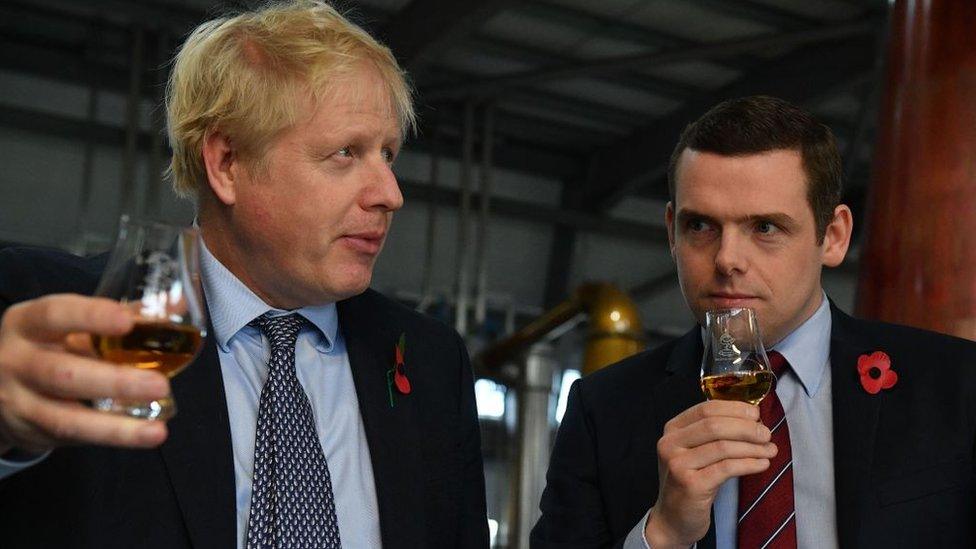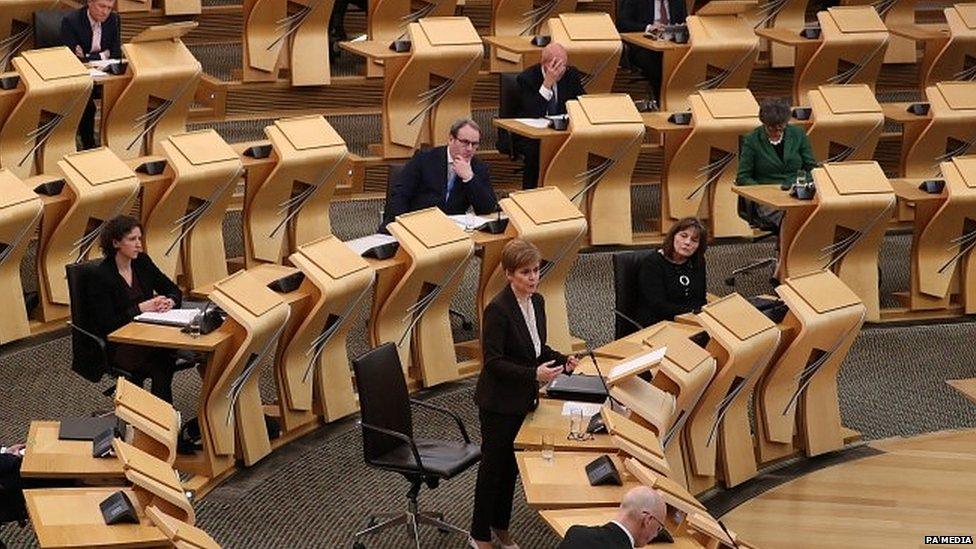Scots Tory leader says Boris Johnson 'believes in devolution'
- Published
- comments

Douglas Ross (right) said he would be speaking directly to the prime minister about his reported remarks
The Scottish Conservative leader has insisted that Boris Johnson does believe in devolution despite reports that he described it as a "disaster".
Douglas Ross said he would be speaking to the prime minister later about his reported remarks to a virtual meeting of Conservative MPs.
But he claimed it was the SNP's "obsession" with independence, rather than devolution, that was the problem.
The SNP said the PM had shown his "contempt" for Scotland.
And Scottish Labour said Mr Johnson was currently the biggest threat to the future of the United Kingdom.
The prime minister was in a Zoom meeting with Tory MPs representing dozens of seats in northern England on Monday when he is said to have made the remarks.
The Sun newspaper reported that he told the MPs that "devolution has been a disaster north of the border", and had been former prime minister Tony Blair's "biggest mistake".
It has been suggested by some taking part in the Zoom meeting that Mr Johnson was answering a question that had been put to him about devolution in England.
Number 10 has not denied the reports, with a Downing Street source saying: "The PM has always supported devolution, but Tony Blair failed to foresee the rise of separatists in Scotland.
"Devolution is great - but not when it's used by separatists and nationalists to break up the UK."
Hendry: PM "caught red handed" on Scotland comments
Speaking to BBC Scotland, Mr Ross described the row as a "distraction" ahead of next May's Scottish Parliament election.
He added: "The prime minister was elected as mayor of London twice, so he believes in devolution.
"The Conservative manifesto at the election just a year ago focused on devolution and ensuring that we strengthen devolution right across the country.
"Devolution is not the problem. The problem has been the SNP's obsession over its thirteen and a half years in power with separating Scotland from the rest of the United Kingdom".


This comes six months before vital elections right across the UK, important particularly in Scotland, just when the SNP has been starting to warm up its campaign, and just when discussions about how the UK government ought to respond are taking place too.
It is one thing - and, of course, legitimate - for political rivals to criticise each other. But to suggest the way that Scotland has been run for more than a decade is a "disaster" is quite another.
And the worry among Scottish Tories is the implication that Boris Johnson's understanding of the political situation is far from complete.

But SNP MP Drew Henry said the prime minister's comments "underline the contempt that Boris Johnson and the Scottish Tories have for the people of Scotland".
Speaking on BBC Breakfast he said: "Effectively what they are saying is it's alright for Scotland to have devolution as long as they vote for the Westminster party we want them to."
Former Conservative Scottish secretary Sir Malcolm Rifkind said Mr Johnson's comments were "typical" of the "rather loose language" the prime minister sometimes uses.
"What he should have said is devolution has become a disaster because the Scottish national government, the SNP government in Scotland, are using the Scottish Parliament and the power they've got to try and destroy the United Kingdom," Sir Malcolm told BBC Radio 4's Today programme.
He said the SNP, which has been in power since 2007, has been "pretty useless" on domestic Scottish issues and have become "obsessed with demands for referendums".
"What I'm absolutely certain of is that it was not meant to be an attack on the principle of devolution," he said.

What is devolution?
Devolution is the name for the way powers once held by the government in Westminster have been passed to elected groups in Scotland, Wales and Northern Ireland.
Devolved powers include health, housing, fire services, some areas of transport and education. However, Scotland has always had its own education system and a separate legal system.
The UK government, based in London, has kept many powers, such as defence, foreign policy and most forms of tax.
Public votes about devolution were held in 1997 in Scotland and Wales, and in both parts of Ireland in 1998, as part of the Good Friday Agreement. It led to the creation of the Scottish Parliament, the National Assembly for Wales and the Northern Ireland Assembly.
Some parts of England have directly-elected mayors, who also have devolved powers. The mayor of London, for example, is responsible for transport and policing in the capital.

Holyrood elections in May
Elections for the Scottish Parliament take place next May. The SNP is currently the largest party with 61 MSPs and the Conservative Party is the second-largest with 31 - eight seats ahead of Labour.
Ms Sturgeon's SNP says a second referendum on independence - following Scotland's vote against it in 2014 - should happen if her party wins. But Mr Johnson has ruled this out.
In response to Mr Johnson's reported remarks to Tory MPs, Scotland's First Minister Nicola Sturgeon tweeted: "Worth bookmarking these PM comments for the next time Tories say they're not a threat to the powers of the Scottish Parliament - or, even more incredibly, that they support devolving more powers."

The SNP is seeking a mandate for another independence referendum in May's election
She added that the "only way to protect and strengthen" the Scottish Parliament was through independence for Scotland.
Scottish Labour leader Richard Leonard said the "Neanderthal" reported remarks made by the PM "expose the underlying thinking and philosophy in Downing Street".
He told BBC News the comments were "reminiscent of the voices of Thatcherism and Majorism of the 1980s and 1990s, which were steadfastly opposed to devolution".
"In my view, what Boris Johnson is doing is defying the popular will of the people of Scotland, and I don't think that's a very good place for any prime minister to be in."
- Published16 November 2020
- Published6 November 2020